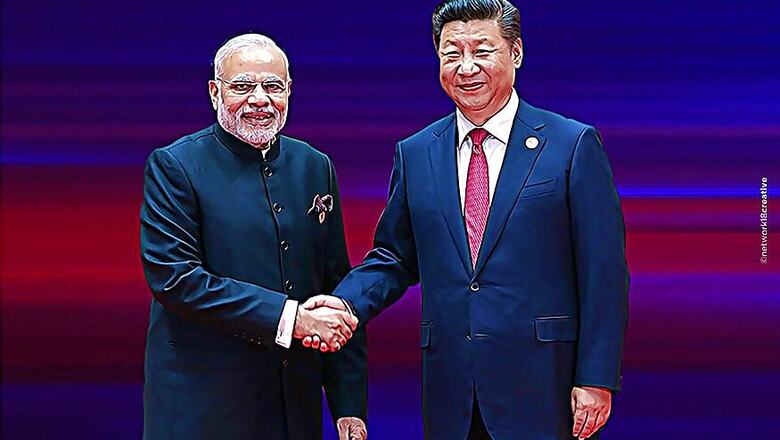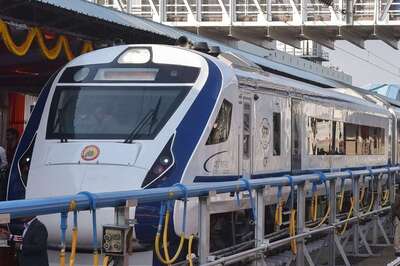
views
The press briefing by Foreign Secretary S. Jaishankar, following the Narendra Modi-Xi Jinping bilateral meeting on the sidelines of the BRICS Summit, expectedly did not reveal much in terms of the next steps in ties between the two nations. What it did, however, underscore is that India and China are ready to work together to enhance mutual trust and strengthen bilateral relations.
While the countries seemed focused on constructive and forward-looking approach, with the Astana consensus, on not letting issues and differences turn into disputes, duly plugged in, the two Asian giants made sure that not too many details of the meeting—the first such apex level interaction following the 73-day standoff at Doklam — were divulged in the public domain. To be sure, the meeting did reinforce the larger background of the BRICS Summit and its deliberations that impact India-China bilateral relations in key areas.
The meeting took place in the backdrop of a long and rough patch of major differences and accompanying bilateral tensions in the prevalent comprehensive power asymmetry that clearly favours China. These include China's ambitious One Belt One Road project, China-Pakistan Economic Corridor, India's longstanding bid for membership of the Nuclear Supplier's Group, and the mother of all tensions—the Doklam crisis. At Doklam India not only displayed political stamina but exhibited classical attributes of a great power in dexterously conflating military gumption with strategic restraint. This served to compel China to vacate its illegal intrusion into disputed territory and was unambiguously perceived as a strategic setback for China. On the other hand, while resisting the temptation to gloat, India's standing as a power of consequence and 'security re-assurer' to its immediate and strategic neighbourhood gathered immense traction. This is more so in the context of China's island-making and occupation-policy in South China Sea having remained uncontested all these months and years by regional powers, including the United States.
Viewed another way, the Modi-Xi meeting provided a key opportunity for a follow-up to the BRICS joint declaration expressing concerns about the violent activities of Pakistan-based terrorist groups Lashkar-e-Taiba, Jaish-e-Mohammad and the Haqqani network, and their being bracketed with global terrorist groups like ISIS/Daesh, Al Qaeda, the Xinjiang-focused East Turkistan Independence Movement et cetera. China has come on board for this declaration not out of a change of heart or 'look-good-globally' geostrategic imperatives but due to behind-the -scene hard work by Indian foreign policy and security wonks over many months to drive home to China that terror threat of JeM/LeT and Haqqanis posed even greater challenges to its own national interests.
'
Press reports suggest negotiations for the Doklam stand down and likely BRICS joint declaration went in tandem. BRICS leadership also played a key role: during restricted talks, they condemned unequivocally terrorism in all its forms and manifestations and strongly reiterating that all BRICS countries are victims of terrorism. This left China with no option but to go along with the Joint Declaration that re-affirmed "that those responsible for committing, organizing, or supporting terrorist acts must be held accountable." This marked a Chinese departure from its stance at the BRICS Summit in Goa, even as it went along with naming JeM and LeT at the Heart of Asia ministerial meeting at Amritsar in December 2016.
The impact of the transformed Chinese stance on terrorism on the China-Pakistan bilateral remains to be seen. It may be too early for India to pop the Bubbly given the depth of the China-Pakistan strategic partnership. Pakistan now faces 'triple whammy' pressures on its decades-long pursuit of terrorism as a security policy tool. There is also no clarity on whether the naming of India and Afghanistan- centric terrorist groups by BRICS, in which China is a leading member, marks a change in Beijing's position of stonewalling the UN Security Council initiatives to name Masood Azhar as a global terrorist. It is more than likely that this issue was discussed during the Modi-Xi meeting. Pyongyang's testing of a hydrogen bomb — its 6th and most powerful till date — provided a 'nuclear weapon gun salute' to the BRICS Summit, deeply embarrassing China. Modi and Xi would have exchanged perspectives on this key issue as well
In sum, the Xi-Modi meeting underscored importance of the BRICS vision of the two leaders, Astana consensus on not letting differences become disputes, their respective roles in Asian security in which peace and tranquility constitute the pre-requisite. How the two sides would manage simultaneity of cooperation and competition and yet enhance mutual trust and strengthen bilateral relations on a forward looking and constructive pathway to the future are issues on which both sides would have to keep a careful watch.
(Air Vice Marshal (retd) Kapil Kak is an independent strategic policy analyst. Views expressed are personal)


















Comments
0 comment